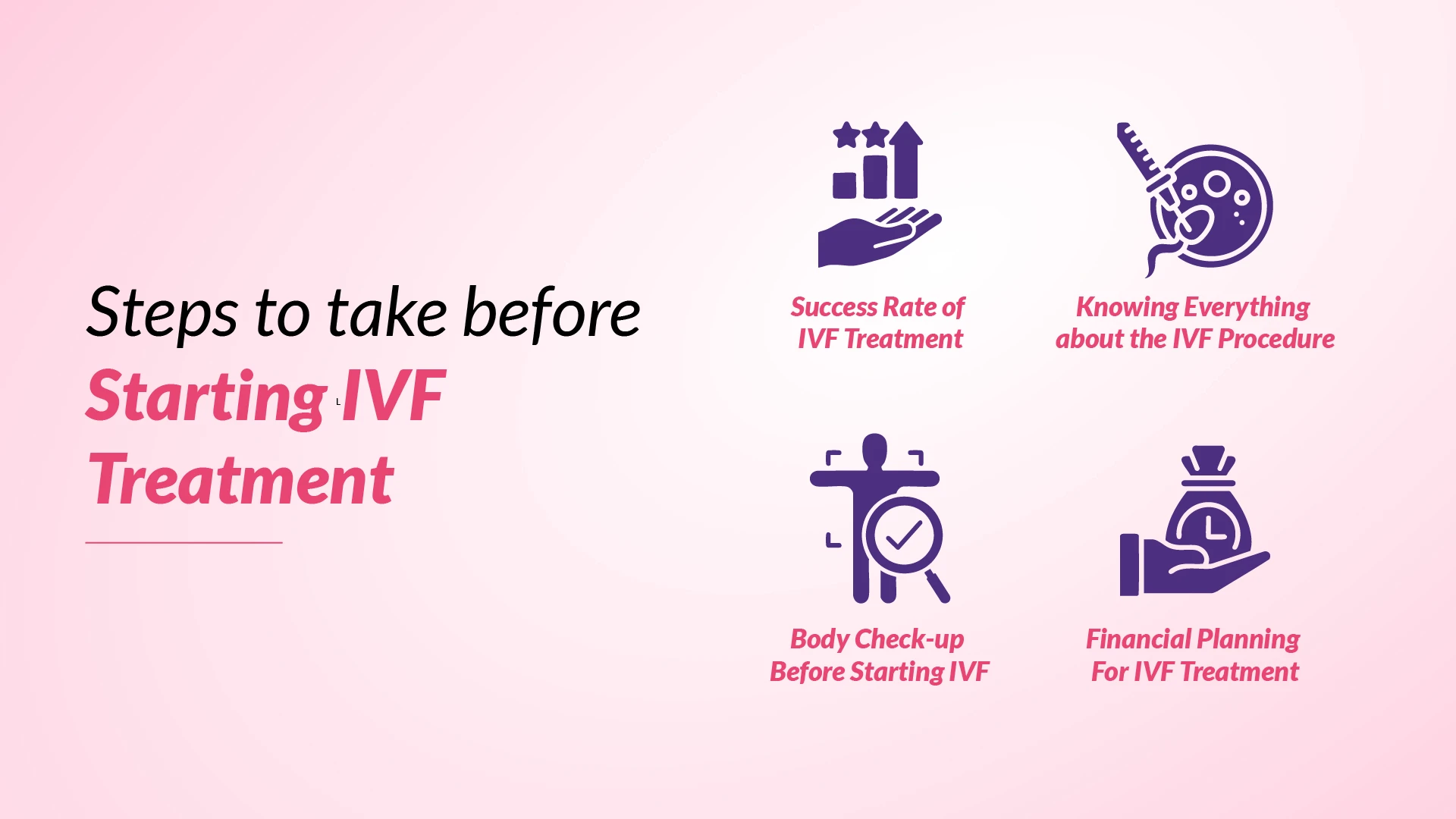IVF is one of the most commonly followed assisted reproductive technologies in recent times. A couple’s own eggs and sperm can be used during IVF. Alternatively, it might involve sperm, eggs, or embryos from the donor, depending on the factors identified. For couples with identified indications and those with failed modalities like IUI, IVF is the preferred treatment option for fertility.
Importance of Preparation Before IVF Treatment
Improving success rates and maintaining general health needs careful planning prior to treatment, and a few steps before IVF has to be followed. Being informed and prepared before IVF treatment helps us prevent uncertainty and last-minute anxiety. A well-planned IVF procedure leads to better results and a more seamless experience.
Things You Need to Do Before Starting IVF
Preparation before IVF is essential to increase the likelihood of success rate of IVF treatment, resolve underlying health problems, improve the quality of eggs and sperm, lower medical complications, and increase emotional willingness.
Success Rate of IVF Treatment
Making sure your body is in the greatest possible condition to support the intricate IVF process increases the likelihood of implantation and a healthy pregnancy. This may be achieved by controlling your weight, food, exercise, and mental preparation. This enhances fertility and raises the success rate of IVF treatment, implantation of the embryo, and subsequent pregnancy.
Learn more about IVF Success Rate by Age
Knowing Everything about the IVF Procedure
A thorough understanding of the IVF process is essential because it enables patients to set their expectations, make educated decisions, and actively engage in their treatment. Understanding every stage, from ovarian stimulation to embryo transfer, lowers anxiety and helps people be prepared to face any obstacles that may arise. Age, medical history, and underlying reproductive problems are some of the variables that affect an individual’s eligibility for IVF.
Body Checkup Before Starting IVF
Before beginning IVF, a thorough physical examination is necessary to guarantee the general well-being of both male and female. Pregnancy risks are also decreased by screening for diseases, including diabetes, thyroid problems, or infections. This comprehensive assessment increases the possibility of a successful outcome by enabling a more individualized approach to therapy. Tests for ovarian reserve, sperm quality, and hormonal abnormalities help customize the IVF treatment plan for the highest success rate. To identify any underlying medical conditions that may impact fertility, the following test can be performed:
- Blood tests for hormonal and Thyroid Function Tests
- Test for Uterine assessment
- Genetic testing
- Pelvic Ultrasound testing
- Ovarian reserve testing
Check Your Diet and Lifestyle Modification
When attempting to get pregnant, lifestyle considerations are crucial. While preparing for IVF, lifestyle decisions such as heavy exercise, alcohol use, cigarette smoking, and illegal drug use should be avoided. The results of IVF are significantly influenced by diet. A well-balanced diet high in vitamins, antioxidants, and good fats promotes reproductive health by enhancing the development of embryos and the quality of eggs. Reducing processed foods and sweets can help enhance hormone balance, while eating more foods high in folic acid, omega-3 fatty acids, and whole grains is linked to higher IVF success rates. Start taking prenatal vitamins. Keep your weight in check and cut back on or stop drinking caffeine.
The Significant Impact of Stress on IVF Success
Stress is a normal and inevitable part of life, but when it becomes chronic, it may have serious consequences for your general well-being, including IVF treatment success. IVF results can be significantly harmed by stress, which can damage both the mental and physical components of fertility. Excessive stress can cause hormonal imbalance, especially the creation of prolactin and cortisol, which can compromise ovulation and the implantation of embryos.
Financial Planning For IVF Treatment
Financial planning is a vital step in preparation before IVF treatment. Since the expenses of IVF treatment might be much higher, financial preparation is crucial. Investigating insurance coverage choices is important because some plans could only pay for a fraction of the treatment. You should also think about establishing savings or financing options like loans or other payment plans.
Research for Best IVF Fertility Clinics
It is necessary to consider various important elements while looking at the top IVF fertility clinics. They are –
- Use validated data from organizations such as the Indian Society for Assisted Reproduction (ISAR) to examine the clinics’ success rates for your age group and medical condition.
- Examine clinic reputations using word-of-mouth referrals, success stories, and testimonials from patients.
- Take into account the clinic’s utilization of cutting-edge technology like genetic testing and embryo freezing.
- Assess the training and credentials of the clinic’s reproductive specialists.
- Compare pricing between clinics and ask about any possible financial solutions, such as insurance coverage or payment plans.
- Give preference to clinics that provide all-encompassing support services, such as counseling and individualized treatment.
Potential Side Effects of IVF Treatment
Ovarian hyperstimulation syndrome (OHSS), which is brought on by an overreaction to fertility drugs and can result in bloating, nausea, and stomach discomfort, is one of the possible adverse effects of IVF treatment. Additionally, there is a higher chance of being pregnant more than once, which can result in issues including low birth weight and premature birth. Additionally, the physical and psychological strains of the IVF procedure can result in emotional stress, anxiety, and mood changes.
Maintain Realistic Expectations
In IVF, keeping a realistic mindset is crucial for controlling expectations and preserving mental health. Couples can better prepare for the prospect of numerous cycles by being aware that success rates might vary depending on factors such as age and medical history. It’s also critical to understand that not every cycle will lead to pregnancy because the process can be unexpected and occasionally prolonged.
Don’t be Discouraged if Your First Cycle Doesn’t Succeed
If your first IVF round is unsuccessful, don’t give up; many people and couples need several tries to successfully have a child. It’s critical to keep in mind that IVF is a complicated procedure and that results might vary depending on a number of factors, such as age, health, and embryo quality. After one or more follow-up efforts, many people discover success, and each cycle offers insightful information that might assist in customizing future treatments.
Conclusion
In summary, taking proper steps before IVF treatment significantly increases the likelihood of success. In order to customize the treatment strategy to each patient’s needs, comprehensive medical examinations are essential, including hormone testing and semen analysis. Keeping up a healthy lifestyle with stress reduction and a balanced diet is also essential for maximizing fertility. Being emotionally and psychologically ready can assist people and couples deal with the difficulties of the IVF process. Ultimately, an extensive and informed approach provides the foundation for a more flawless IVF treatment and success rates.





























